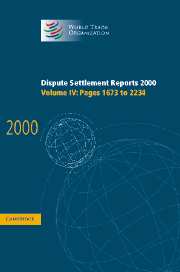United States - Tax Treatment for “Foreign Sales Corporations” (WT/DS108): Report of the Panel
Published online by Cambridge University Press: 22 December 2017
Summary
INTRODUCTION
On 18 November 1997, the European Communities requested consultations with the United States under Article 4 of the Understanding on Rules and Procedures Governing the Settlement of Disputes (“DSU”), Article XXIII:1 of GATT 1994, and Article 4 of the Agreement on Subsidies and Countervailing Measures (“SCM Agreement”) with respect to “Sections 921-927 of the Internal Revenue Code and related measures establishing special tax treatment for “Foreign Sales Corporations” (“FSCs”)”.
On 4 March 1998, the European Communities requested the consultations “to be extended also to include consultations under Article 19 of the Agreement on Agriculture” (“AA”).
The European Communities and the United States held consultations on 17 December 1997, 10 February 1998, and 3 April 1998, but failed to reach a mutually satisfactory solution. On 1 July 1998, the European Communities requested the establishment of a panel under Article 6 of the DSU, Article 4 of the SCM Agreement, Article 19 of the AA, and Article XXIII of GATT 1994.
At its meeting on 22 September 1998, the Dispute Settlement Body (“DSB”) established a panel in accordance with Article 6 of the DSU with the following standard terms of reference:
“To examine, in the light of the relevant provisions of the covered agreements cited by the European Communities in document WT/DS108/2, the matter referred to the DSB by the European Communities in document WT/DS108/2, and to make such findings as will assist the DSB in making the recommendations or in giving the rulings provided for in those agreements.”
Barbados, Canada, and Japan reserved their rights to participate in the panel proceedings as third parties.
On 9 November 1998, the parties to the dispute agreed on the composition of the Panel as follows:
Chairman: Mr. Crawford Falconer
Members: Mr. Didier Chambovey
Professor Seung Wha Chang
The Panel met with the parties on 9-10 February 1999 and 16 March 1999. It met with the third parties on 10 February 1999.
ACTUAL ASPECTS
A FSC is a corporation created, organised, and maintained in a qualified foreign country or US possession outside the customs territory of the United States under the specific requirements of Sections 921-927 of the US Internal Revenue Code.
- Type
- Chapter
- Information
- Dispute Settlement Reports 2000 , pp. 1675 - 2030Publisher: Cambridge University PressPrint publication year: 2002
- 3
- Cited by

